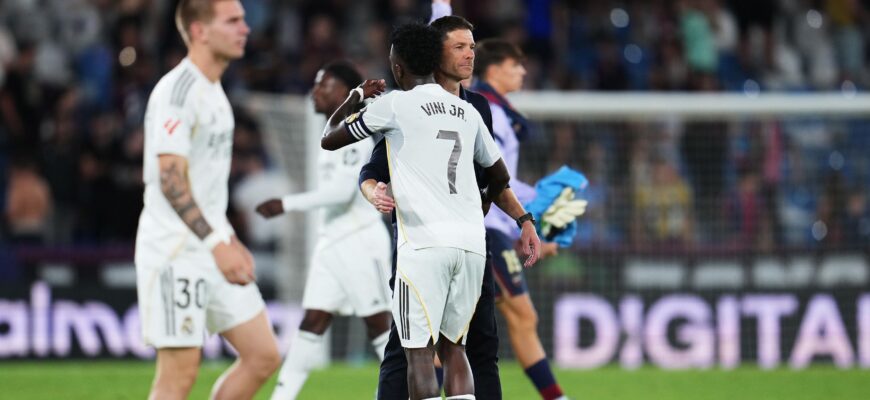The Champions League anthem, that glorious hymn of European football, always brings a unique blend of anticipation and pressure. For Real Madrid, it`s not just a competition; it`s their spiritual home. And when the new season`s opener arrived, with the dazzling acquisition of Kylian Mbappé bolstering an already formidable squad, expectations were predictably stratospheric. Yet, amidst the pre-match buzz, a notable absence from Xabi Alonso’s starting XI raised more than a few eyebrows: Vinicius Jr., Real Madrid’s electrifying Brazilian winger, was on the bench.
A Manager`s Dilemma: Rotation or Revelation?
In modern football, especially at the pinnacle of European club competition, squad rotation is less a luxury and more a strategic imperative. Managers, faced with grueling schedules and a galaxy of talent, must constantly weigh the immediate need for victory against the long-term health and development of their players. Alonso, a master tactician in his own right, seemed to be navigating this very tightrope. His decision to entrust the attacking flanks to young talents like Franco Mastantuono and Rodrygo, alongside the central force of Mbappé, was a clear statement: this Real Madrid team has depth, and every player, no matter their stature, is part of a larger, evolving system.
It was a bold move, perhaps a test of the squad`s collective mettle, or an attempt to conserve Vinicius for future battles. One might even muse that it was a subtle managerial chess move, aiming to underscore the team`s ability to perform without relying solely on one individual. After all, what better stage to prove the strength of your supporting cast than the grand European debut?
The Early Gambit: A Test of New Formations
The tactical setup saw Real Madrid lining up in a 4-3-3, a formation that fluidly morphed into an attacking 3-3-1-3. Arda Guler, an exciting prospect, shifted into a more advanced role, while Alvaro Carreras offered width as a right winger, a departure from the traditional full-back. Mbappé spearheaded the attack, with Rodrygo on the left and Mastantuono, making his Champions League debut, on the right. The intent was clear: dynamic movement, fluid positions, and an emphasis on collective attacking prowess.
However, football often writes its own script, oblivious to managerial blueprints. The match, far from being a comfortable showcase of Madrid`s depth, proved to be a tighter affair. The opponent, Olympique Marseille, coached by the astute Roberto De Zerbi, presented a resolute challenge, absorbing pressure and striking with purpose. Indeed, it was Marseille who drew first blood, a stark reminder that even the most star-studded ensembles can stumble if a crucial piece of their rhythm is out of sync.
The Inevitable Call: Vinicius Answers
As the second half unfolded, the scoreline—a mere 1-0 deficit—and the growing tension in the air prompted the inevitable. Xabi Alonso made the call. Vinicius Jr. rose from the bench, a familiar sight to fans accustomed to his game-changing impact. And change the game, he did. Within minutes of his introduction, the stadium seemed to hum with a different energy. His first touch wasn`t just a touch; it was a declaration. His movements weren`t just runs; they were probing incursions into the opponent`s resolve.
It was from one such dazzling individual foray that Real Madrid earned their crucial second penalty, an outcome directly influenced by Vinicius`s relentless drive. This moment, occurring even as Real Madrid found themselves a man down after Dani Carvajal`s red card, served as a poignant underscore: sometimes, raw, uncontainable talent is simply irreplaceable. Mbappé, from the spot, completed his brace, securing a hard-fought 2-1 victory. The win was sealed, but the narrative had shifted.
Beyond the Score: A Glimpse into the Future
The statistics, often cold and impartial, noted Real Madrid’s deserved win, with an impressive xG of 3.65. Yet, the feeling lingered: Vinicius Jr.’s presence brought not just an edge, but a transformative quality to their attack. He played for only 27 minutes, with 15 touches and two shots, but his arrival provided that unique spark, that ability to disorganize defenses with sheer audacity and skill.
This match, then, was more than just a Champions League opener. It was a fascinating case study in managerial strategy versus undeniable individual brilliance. Alonso`s desire to cultivate a deep, adaptable squad is commendable and essential for long-term success. The emergence of players like Mastantuono and Guler offers exciting prospects for the future, ensuring Real Madrid’s continued dominance.
However, the immediate takeaway was clear: while Real Madrid possess a wealth of talent and are certainly developing a formidable depth, they might not yet be entirely ready to tackle the biggest European nights without their Brazilian maestro. The challenge for Alonso, moving forward, will be to perfect this delicate balance – harnessing the collective strength of his squad while knowing precisely when to unleash the individual genius of players like Vinicius Jr. After all, some risks pay off handsomely, but others serve as timely, albeit dramatic, reminders of who truly holds the keys to unlocking a stubborn defense. And in the high-stakes theatre of the Champions League, sometimes you simply can`t leave your best performers waiting in the wings for too long.







